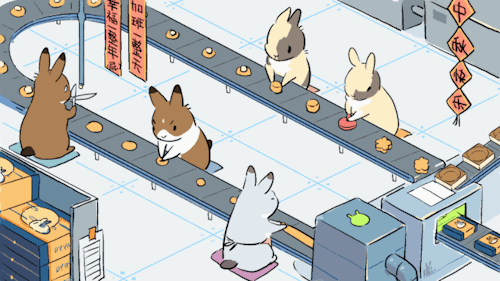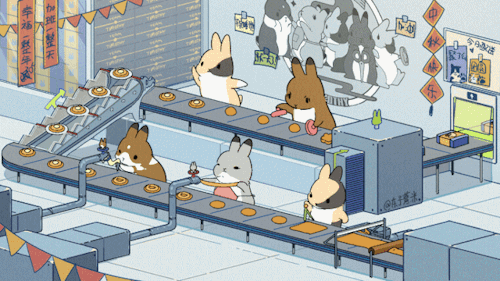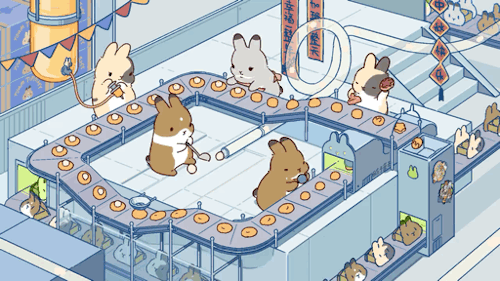Interesting.

Interesting.
More Posts from Briashard and Others
For me this isn't even about empathy or sympathy (though there's value in those as well), it is just straight-up a human rights thing. Once you have decided that there is *any* category of human that can be treated as less-than-human you've said that humanity is conditional, and so are the rights that come with it. You've already lost, you've granted the fascists their point because *you agree with them* that some people don't deserve to be treated like humans.
guys we’re not being cringe to keep out the twitter users. we’re being cringe to keep out the ALGORITHMS, the CAPITALISTS, the INFLUENCERS. twitter users are welcome as long as they agree this site is UNMARKETABLE



©东予薏米 jade rabbits making mooncakes for mid-autumn festival
the key to surviving grad school (also maybe life but definitely grad school) is to pick a side quest every few months or so. something that brings you joy and that you can get better at over time, independent of whether or not your research or classes are going well. put your need for academic validation to use in a non-academic setting and everything will feel less dire and you will learn you are more than your work

it's okay if you're tired when you thought you'd be productive. none of us know how we're going to feel. even if you think positively, you may still be tired. sometimes, the only thing that can make you feel better is taking a break. please don't be so hard on yourself.
hope is a skill

There’s a protest going on against AI art over on artstation, so I feel like now is the time for me to make a statement on this issue!
I wholeheartedly support the ongoing protest against AI art. Why? Because my artwork is included in the datasets used to train these image generators without my consent. I get zero compensation for the use of my art, even though these image generators cost money to use, and are a commercial product.
Musicians are not being treated the same way. Stability has a music generator that only uses royalty free music in their dataset. Their words: “Because diffusion models are prone to memorization and overfitting, releasing a model trained on copyrighted data could potentially result in legal issues.” Why is the work of visual artists being treated differently?
Many have compared image generators to human artists seeking out inspiration. Those two are not the same. My art is literally being fed into these generators through the datasets, and spat back out of a program that has no inherent sense of what is respectful to artists. As long as my art is literally integrated into the system used to create the images, it is commercial use of my art without my consent.
Until there is an ethically sourced database that compensates artists for the use of their images, I am against AI art. I also think platforms should do everything they can to prevent scraping of their content for these databases.
Artists, speak out against this predatory practice! Our art should not be exploited without our consent, and we deserve to be compensated when our art is exploited for commercial use.

42+ ways to fix a story in progress
(Also posted on: 42+ ways to fix a story)
Here is a list of (some) ways to fix a draft or story in progress. I started it in the observation journal when I was struggling with some story changes.
In summary, these can be reduced to intensify; focus/tighten; swap/invert. But in a tight spot, specifics are often more useful. And making the list was also important, because it reassured me I knew all these techniques, and had used them before, and should calm down.
List 10 terrible endings (adapted from a Helen Marshall exercise), or just 20 endings. Or 100…
Re-outline it
Map it onto another story (I like to quick-outline fairy tales until one resonates, and then identify the parts to strengthen)
Fill it out as a synopsis questionnaire (I used to use Sue Dennard’s 1-page synopsis to trap story ideas)
Ask — what is the story behind the story?
Change the place
Change the era
Genderflip main character
Genderflip everyone
Change the genre
Change the adjectives
Describe the story in one emotion, & align/adjust
Do the same for each scene/section (see also three moods)
Flip (main) character’s personality (quiet to loud, etc)
What happens after
What happens before
What’s happening at the same time
It’s a metaphor for: ___
Pick/change emotional note for end
Scene-map
Match to 3-act structure
Match to 5-act structure
Give characters a preoccupation or secret
Start it later
Start it earlier
End it earlier
End it later
Map it onto a song
Blow something up
Make everything worse
Change [define & intensify] the aesthetic
Explain the reasons
Invert
Make it/ the weak bits A Whole Thing
Make it/ the weak bits a Good/Bad Thing
Make it/ the weak bits The Shape of the World
Tell from a non-obvious point of view (see also: by whom and to whom, and some less common points of view)
Change the type of character in the role (think archetypes and stereotypes)
Change drama – pose (?)
Change motifs
Change sentence structure
Change form, shape (e.g. list, pastiche, non-fiction)
And to these I’d add:
change voice, and
change age.
I might add more as I go. But in the meantime: hey, my debut collection of short stories, KINDLING, is now out from Small Beer Press (in the USA, and coming soon to Australia). It includes the new story “Annie Coal”. And if you look closely at the journal page above, you’ll see that was the story I was editing when I made this list.

Might I give some advice:
Not everyone has (or needs to have) the energy to thoughtfully respond to republicans on the Internet. You do not have to do that.
But some people do, and can. And I think we gotta let them.
An example:
I have a former teacher, I'll call her Grace, who is an incredibly kind woman in her 70s. Devout catholic, had voted for various parties over the years, but has been pretty strictly democrat over the past 15-20 because that aligns with her values of kindness and service.
She shared a post about the pope's recent letter and expressed that she agreed with his concerns about how trump is treating immigrants. A friend of hers commented a long paragraph basically saying "dear Grace I care for you but I don't understand how you can be a Christian and a democrat. Blah blah abortion blah blah gender blah blah drugs."
Grace replied "I'm very busy right now but I am going to respond to you soon with my thoughts". When she did it was an incredibly generous, rational monologue that connected with this person's humanity, their shared religious values, and made a beautiful case for why she supports who she does. I didn't agree with a good half of what she said as I am not a Christian, but the result was an expression of values that I think put her on the side of justice and compassion.
The person replied and thanked her and said she had a lot to think about. It was probably the best case scenario for a Facebook politics conversation
You know what came very close to ruining it? A bunch of (mostly younger) people piling on with "fuck you you racist maga pos" and "no one has to explain anything to you, go to hell" etc etc. Even after Grace wrote that she intended to reply herself.
I watched this republican respond to all the easy, quick insults by saying "this is why I don't think any democrats can be Christian, this is how you all speak to me." If Grace hadn't put so much work into writing her response in a way that was tailored to fit this person, I would not be surprised if that person left Facebook doubly certain that Christian nationalism is the way to go.
I'm not saying we can't cuss out jackasses. I'm not saying everyone needs to respond to bad faith arguments like Grace did or use their time like she did.
But this was on Grace's Facebook page, and interrupted the work she already volunteered to do. Just so these individuals could feel like they "did something" and got a shot off at an enemy.
I think that's selfish and childish and unproductive. They could have said anything they wanted in their own space, but they made grace's job harder for no fuckin reason. And then "loved" her reply and said "that was beautiful Grace, thank you for sharing your thoughts"
Like... Buddies. Pals. If someone volunteers to scrub the toilet fucking let them.
-
 alexiel351 liked this · 3 months ago
alexiel351 liked this · 3 months ago -
 xieron-draxin reblogged this · 3 months ago
xieron-draxin reblogged this · 3 months ago -
 gigglepuffpixie liked this · 3 months ago
gigglepuffpixie liked this · 3 months ago -
 sitvisvobiscum liked this · 3 months ago
sitvisvobiscum liked this · 3 months ago -
 cynicaloptimism2 liked this · 3 months ago
cynicaloptimism2 liked this · 3 months ago -
 briashard reblogged this · 3 months ago
briashard reblogged this · 3 months ago -
 heydrangeas liked this · 3 months ago
heydrangeas liked this · 3 months ago -
 cheeseburger-and-vine liked this · 3 months ago
cheeseburger-and-vine liked this · 3 months ago -
 fuckdumblr reblogged this · 3 months ago
fuckdumblr reblogged this · 3 months ago -
 fuckdumblr liked this · 3 months ago
fuckdumblr liked this · 3 months ago -
 hellcatblues reblogged this · 3 months ago
hellcatblues reblogged this · 3 months ago -
 zinginger liked this · 3 months ago
zinginger liked this · 3 months ago -
 wrekky liked this · 3 months ago
wrekky liked this · 3 months ago -
 justsayin59 reblogged this · 3 months ago
justsayin59 reblogged this · 3 months ago -
 justsayin59 liked this · 3 months ago
justsayin59 liked this · 3 months ago -
 crazyworldhuh reblogged this · 3 months ago
crazyworldhuh reblogged this · 3 months ago -
 nodynasty4us reblogged this · 3 months ago
nodynasty4us reblogged this · 3 months ago -
 nodynasty4us liked this · 3 months ago
nodynasty4us liked this · 3 months ago -
 sakura1203 liked this · 3 months ago
sakura1203 liked this · 3 months ago -
 erikag59 reblogged this · 3 months ago
erikag59 reblogged this · 3 months ago -
 lily-ackerman liked this · 3 months ago
lily-ackerman liked this · 3 months ago -
 jesstheespeon reblogged this · 3 months ago
jesstheespeon reblogged this · 3 months ago -
 jesstheespeon liked this · 3 months ago
jesstheespeon liked this · 3 months ago -
 piictochat reblogged this · 3 months ago
piictochat reblogged this · 3 months ago -
 screeno42 reblogged this · 3 months ago
screeno42 reblogged this · 3 months ago -
 blow-p0p reblogged this · 3 months ago
blow-p0p reblogged this · 3 months ago -
 alterboyx liked this · 3 months ago
alterboyx liked this · 3 months ago -
 landlockedcorsair reblogged this · 3 months ago
landlockedcorsair reblogged this · 3 months ago -
 retroadventures liked this · 3 months ago
retroadventures liked this · 3 months ago -
 sympt0mssyndrome reblogged this · 3 months ago
sympt0mssyndrome reblogged this · 3 months ago -
 erikag59 liked this · 3 months ago
erikag59 liked this · 3 months ago -
 theawesometrinculo reblogged this · 3 months ago
theawesometrinculo reblogged this · 3 months ago -
 petrus91105 reblogged this · 3 months ago
petrus91105 reblogged this · 3 months ago -
 petrus91105 liked this · 3 months ago
petrus91105 liked this · 3 months ago -
 iona-shield-of-emeria liked this · 3 months ago
iona-shield-of-emeria liked this · 3 months ago -
 poetry-protest-pornography liked this · 3 months ago
poetry-protest-pornography liked this · 3 months ago -
 perriot-parrot liked this · 3 months ago
perriot-parrot liked this · 3 months ago -
 berosar liked this · 3 months ago
berosar liked this · 3 months ago -
 miloandpatxishuman reblogged this · 3 months ago
miloandpatxishuman reblogged this · 3 months ago -
 theonewhopoops reblogged this · 3 months ago
theonewhopoops reblogged this · 3 months ago -
 fraddit reblogged this · 3 months ago
fraddit reblogged this · 3 months ago -
 fraddit liked this · 3 months ago
fraddit liked this · 3 months ago -
 frozenprocedural reblogged this · 3 months ago
frozenprocedural reblogged this · 3 months ago -
 frozenprocedural liked this · 3 months ago
frozenprocedural liked this · 3 months ago -
 manectrick liked this · 3 months ago
manectrick liked this · 3 months ago -
 bantambookeater liked this · 3 months ago
bantambookeater liked this · 3 months ago -
 bantambookeater reblogged this · 3 months ago
bantambookeater reblogged this · 3 months ago -
 indigowings reblogged this · 3 months ago
indigowings reblogged this · 3 months ago

246 posts